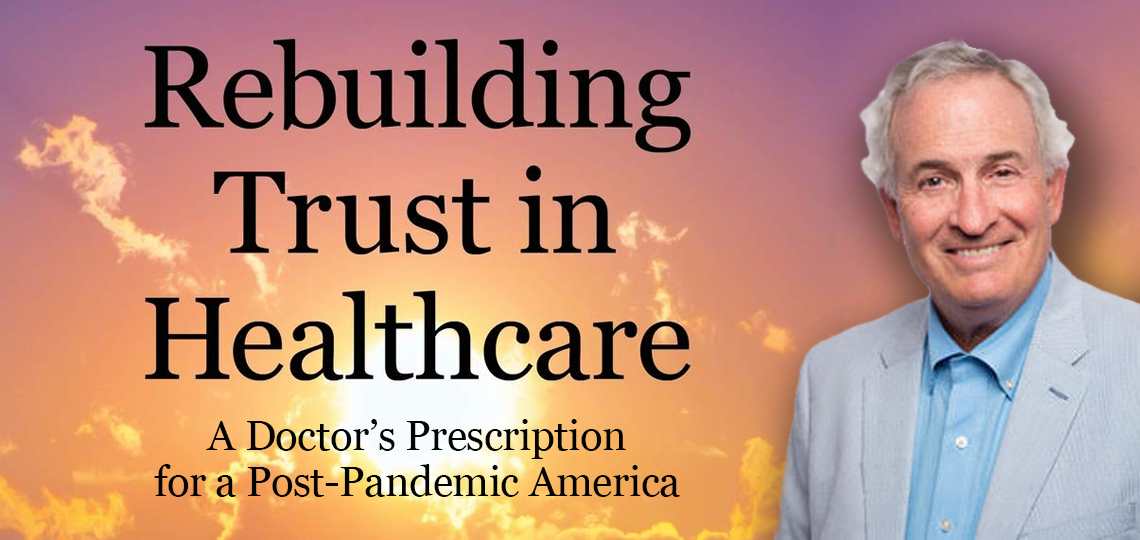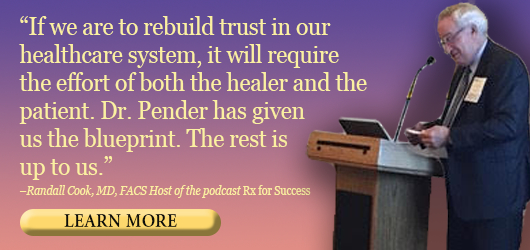Reviewer Eileen Gonzalez Interviews Paul Pender, Author of Rebuliding Trust in Healthcare

It’s a sorry state of affairs when, in the case of the US healthcare system, you seek to purchase something critical to your good health from your local hospital and the sources for the charges are obscured. Can you think of any other industry that treats its customers with such a degree of bad faith—at a time when medical bills are the number one cause of personal bankruptcy? Patients have every reason to look at the US approach to healthcare with skepticism.

In Rebuilding Trust in Healthcare, Paul Pender seeks to change that soured attitude by advocating for more transparency. He’d like patients to be comfortable asking their doctors and healthcare providers questions like “why are you recommending that procedure?” and “how much exactly will it cost?”
Intrigued with his empowering ideas, we asked reviewer Eileen Gonzalez to follow up with a few timely questions following her recent Clarion review of the book (link to review when it’s completed). Paul was gracious enough to agree.
Eileen, take it from here.

Rebuilding Trust in Healthcare has a unique format, in that it’s organized like a medical report, starting with a description of the “chief complaint” (distrust in America’s healthcare system) before moving on to a discussion of the background, causes, and effects, and ending with a mock Zoom call that outlines potential solutions. This makes the book more memorable and interesting, but I’d like to hear from you why you chose this format.
The format for a case presentation came to me as I was assembling items in “buckets” on my computer. The subjects flowed in a way that was familiar to me. As medical students, we learn to organize our thoughts and to present information in ways that our attending physicians could easily follow, since the “template” was already embedded in their professional brains. I believed that using such a formula would help address a complex subject, and the side bars were chosen as examples of what might be equivalent to “data points” for physicians hearing a case presentation.
Although you do discuss COVID-19 and its effects, your main focus is on healthcare in general, and how existing problems with American healthcare have been highlighted and exacerbated by the pandemic. Do you think there are opportunities to start rebuilding trust immediately, or is there still too much uncertainty to do anything meaningful right now? In short, is the pandemic a “planning” phase or a “doing” phase when it comes to implementing trust-building changes?
There is no time like the present to start rebuilding trust. The book only touches on the potential for vaccines for preventing the spread of COVID-19. However, for a vaccination program to be accepted, people will have to trust the science behind the claims of efficacy. The clinical trials that led to approval will have to have been conducted properly, with accurate reporting of possible side effects. Furthermore, priority for introduction of vaccines should be given to those most vulnerable to attack by the virus, including our medical first responders, those in our food supply chain, those with pre-existing conditions who have an increased risk of death from coronavirus, our senior citizens, and minority populations at high risk (and who have suffered disproportionate rates of death from infection).

You talk about the need for greater transparency regarding the costs of healthcare. Secretive contracts between hospitals and insurance companies, predatory bill collecting, and shocking and exorbitant bills all hurt trust. Do you think transparency would have any effect on the price of healthcare, which is simply too high for many people? And how does the affordability of healthcare and health insurance—or lack of affordability—contribute to patient distrust?
Price transparency is at the heart of the recent rule from US Health and Human Services, which goes into effect on January 1, 2021. Hospitals must report the cost of their services so that consumers can more effectively shop for such services. Quoting from Ernst & Young, “the rule requires that most health plans and health insurers not only provide easy-to-understand personalized information on enrollee cost-sharing for healthcare services, but must also publicly disclose the rates they actually pay healthcare providers for specific services.” Price transparency is only the start of the movement to unveil where the high cost of care originates. People distrust the “black box” that drives costs until they see what’s in the box.
In chapter 8, you emphatically state that the Affordable Care Act will not go away. Given recent changes to the Supreme Court, do you still stand by that opinion? And, if the ACA is repealed, what effect do you think this will have on the trust or lack thereof between patients and the healthcare system?
I am no legal scholar, but I firmly believe that the Affordable Care Act will be upheld by the US Supreme Court. The argument for severability of the mandate to have insurance or pay a fine (a “tax”) from the law will be cited. In my mind, the main reason for upholding the law as constitutional is that so many people rely on the Act for health insurance, a response that began a decade ago. I have been following this issue since before Justice Barrett was added to the Court, and I still believe that a majority will uphold the law.

Your book makes it clear that this is a longstanding problem with no simple solutions. It is easy for people to feel helpless in the face of such challenges. Is there anything that patients can do right now to empower themselves and improve their healthcare experience?
Perhaps the two most important questions people should ask their physicians and their healthcare institutions are “Why?” and “How much?” A doctor should answer a patient’s questions to the patient’s satisfaction. Institutions, like clinics and hospitals, should be challenged for actual costs of care. The key is for patients to obtain reliable information before they face a health crisis.
Barbara Hodge
